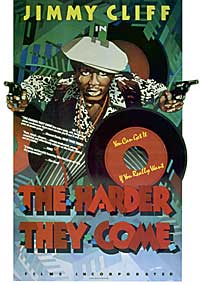While everyone knows about Brooklyn’s annual
Caribbean spectacular, the West Indian Carnival and Parade on
Labor Day – and its attendant glorious music and colorful regalia,
not much thought is given to the crushing poverty and racism
these Caribbean-Americans escaped when they came to Brooklyn.
This year, the Brooklyn Academy of Music chose to look beneath
the sequined surface through the transporting vehicle of film.
Their latest film series, "Catch a Fire: Caribbean Diaspora
Films" is an exploration of both the joys and hardships
of living in the Caribbean today, of being a Caribbean emigrant
and even the fallen heroes of the islands’ history. The series
is a collection of widely varying films including documentaries
and even a comedy.
The series is named for "Catch a Fire," a 1995 documentary
about the 19th-century Jamaican civil rights activist Paul Bogle,
directed by Menelik Shabazz. In many ways, "Catch a Fire"
feels like the film they show you before you enter Colonial Williamsburg.
There’s lots of narration and re-enactors. (And there’s a big
difference between the words "re-enactor" and "actor.")
The power of the 30-minute work is in the spoken word. Just as
Bogle was a deacon who enlightened his congregation of oppressed
blacks about politics, Shabazz’s script illuminates the viewer
about England’s heavy-handed domination of the island. While
America’s 13 colonies might have identified with wanting to rebel
against England, our history textbooks do not record the lives
of Jamaica’s brutally murdered black activists like Bogle, who
should not be forgotten. The film closes the series on Sept.
3.
On the other end of the spectrum is the cult classic, "The
Harder They Come" (1972), directed by Perry Henzell. This
film is – rightfully – the series’ centerpiece, screening Aug.
31. When the film was released it brought the distinctive sound
of reggae to a wide audience and launched reggae legend Jimmy
Cliff to stardom. Its stylish filmmaking – peppered with montages
– and the vintage chic clothing and cars still dazzle. But the
candy coating quickly wears away as Henzell reveals the city
of Kingston as a poverty stricken place where it’s every man
– and woman – for himself.
Naive Ivan (Jimmy Cliff) comes from the country to the big city
to pursue his dream of becoming a reggae superstar. He gets a
quick education in self-preservation in a place where everyone
from the preacher to the cops to his friends are corrupted.
Henzell also includes long pan shots of the needy, unflinchingly
documenting women and children scavenging at the dump. A bloody
altercation erupts between Ivan and another man over a bicycle
with $6 tires. Henzell paints clearly the bleak prospects for
a young man in this big city with scenes of Cliff in the recording
studio that are reminiscent of Elvis Presley in "Jailhouse
Rock" (1957). He deliberately echoes the lawlessness of
Hollywood Westerns.
Henzell will be present for a Q&A following the 6:30 pm screening.
Fast forward 30 years to Stephanie Black’s "Life + Debt"
(2001). The documentary returns on Sept. 1 after a sold-out BAM
engagement in February. (Read
GO Brooklyn’s original review.)
The slick, must-see documentary explores the beautiful Jamaica
of today as seen by tourists and the underlying, enduring poverty
veiled from their view. This documentary breaks with tradition
by weaving in narration from Jamaica Kincaid’s previously published
"A Small Place."
"Life + Debt" brings to the surface the economic destruction
wrought by the invisible hands of the International Monetary
Fund and World Bank on this – and many other – Third World economies.
Most disturbing of all, Black provocatively points out how all
of us in the United States and Europe are unwitting accomplices
in Jamaica’s suffering. (I was startled to see underwear I purchased
in Manhattan being sewn in the militaristic Kingston "free
zone" sweatshop.)
Black gets all of the bigwigs to talk on camera about why and
how they keep Jamaica’s people in dire straits.
While Black goes to the top to figure out why Jamaicans are suffering
economically, Claudette Coulanges’ documentary "Looking
for Life" (1999) examines with long, leisurely takes, the
lives of two citizens in Haiti – one who works in a factory and
another who cooks for factory workers. "Looking for Life"
demonstrates how the decimated economy wreaks havoc on individuals
and families – not through interviews with the policy makers
and university professors, but through the words and lives of
two exhausted women.
Coulanges follows a woman who has created a job for herself,
providing the meals for workers in a factory. But the viewer
soon understands that the individual born into this society,
no matter how sharp her entrepreneurial skills – must get worn
out and kicked to the curb, because eventually she’ll need to
take a day off.
In Port au Prince, everything is an ordeal: getting a pot, buying
the food at the market, getting a ride to the factory, making
the food in the dirt of a courtyard, serving the food, waiting
outside the factory on payday to get payment from the workers
for their week of lunches, going home and doing the backbreaking
housework that awaits there. There are no washing machines. No
vacations.
Just as Black demonstrates that Jamaica’s economy is crippled
by imported goods, Coulanges shows that these impoverished people
have no choice but to buy the cheaper, imported goods – and not
support their own indigenous economy – because that’s all they
can afford.
"Looking for Life" will be screened on Sept. 3.
A film series about Caribbean culture would be remiss if it didn’t
include a sprinkling of levity. Pascal Legitimus’ comedy "Caribbean
in Paris" (2000), which opens the series on Aug. 29, provides
heaps of silliness.
The mayor of Guadeloupe’s wife is kidnapped while on a business
trip in Paris. He arrives with his two grown sons to track her
down, and is joined in his search by a well-meaning cop, who
also happens to be a trash-mouthed, single mother bullied by
her male boss.
Throw in the 800,000 Caribbeans who live in France with "jobs
white people don’t want" who use their lowly positions in
the telephone company, metro and sanitation to aid the mayor’s
family in thwarting the kidnappers, and the silly slapstick film
begins to feel like "Revenge of the Nerds." The difference:
Legitimus includes very real subtexts concerning pervasive racism,
police corruption and corporate greed.
Look for Legitimus in several small parts in the film including
a taxi driver, a cleaning woman and a DJ.
Finally, Sander Francken’s "Papa’s Song" (1999), screening
on Aug. 30, is an incredibly intense, deep examination of the
relationship between two Curacao sisters, Magda and Shirley,
and the implications of race relations on the island and in Holland.
This dark, brooding film is dense, gripping – at times muddled
– but always disturbing. (Francken includes some graphic rape
scenes.) The suspenseful film and its great performances will
haunt you long after the credits have rolled as you attempt to
decipher the nature of the sisters’ relationship. Plan to stop
for a drink on your way home.
The series also includes Felix de Rooy’s "Ava and Gabriel:
A Love Story," a vivid portrait of Curacao in the 1940s
and the love affair between a Dutch painter and his model, and
"The Last Rumba of Papa Montero," a documentary directed
by Octavio Cortazar about the legendary Cuban rumba dancer. Both
films will be shown on Sept. 2.
No matter which film you choose – documentary or feature – this
selection of Caribbean films provides insight into aspects of
Caribbean cultures that often get lost in the revelry and revealing
costumes of the Labor Day parade.
BAMcinematek presents "Catch a Fire: Caribbean Diaspora
Films" Aug. 29 to Sept. 3 at 30 Lafayette Ave. at Ashland
Place. Tickets are $9, $6 students, seniors and children under
age 12. For a complete film schedule, call (718) 636-4100 or
visit www.bam.org.

























